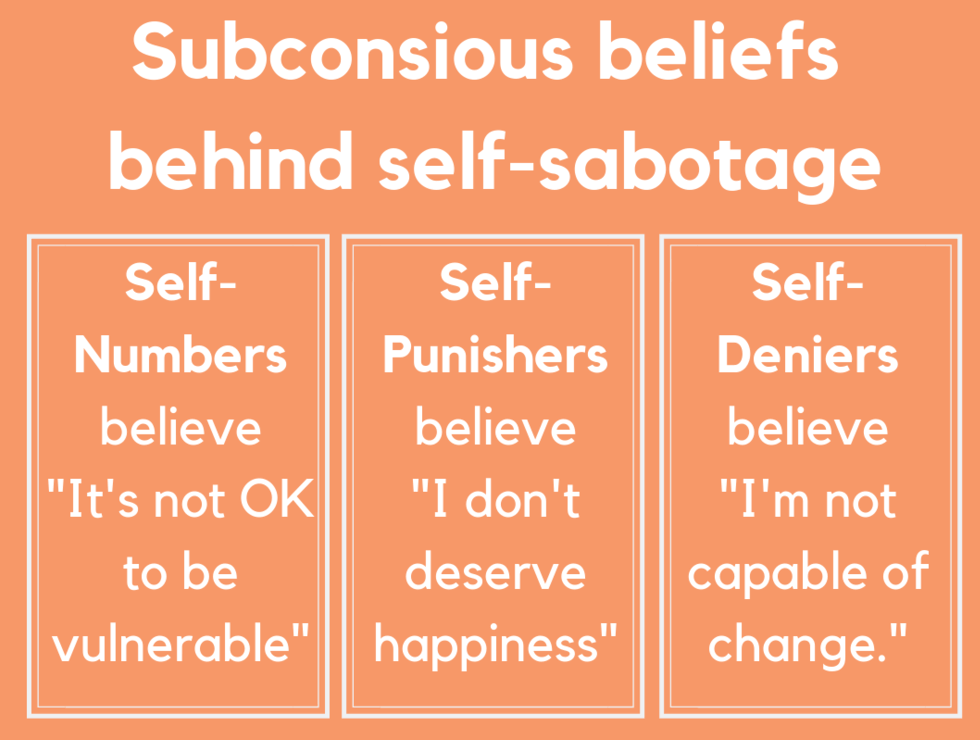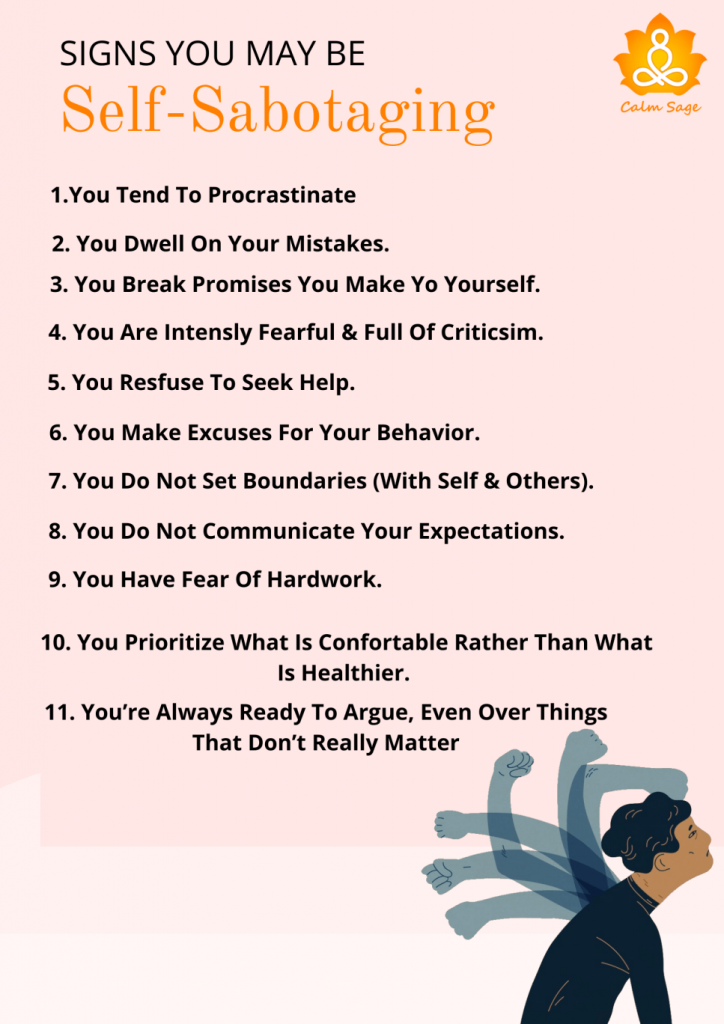Why We Don’t Always Get What We Want – Because We Self-Sabotage!

Self-Sabotaging seems a little tricky & usually individuals sabotage without even realizing it! Can you be one of them? Keep reading to know about the phenomenon & how to control self-sabotaging behavior!
If you’ve heard the popular 1999 pop-punk hit “My Own Worst Enemy” by Lit, then my pal you are already aware of what Self-Sabotage means. But if you haven’t heard of the phenomenon yet, allow me to give you a modern rock lesson on what is Self-Sabotaging & how do we stop the self-sabotaging behavior to make our lives more successful and less conflicted.
Self Sabotage Meaning:
Have you ever engaged in self-destructive behavior?
Do you often feel unmotivated whenever you are trying to do something new or important?
Do you often feel that you are not good enough to achieve a goal or task?
If the answer to all these questions is ‘Yes’, then chances are you might be exhibiting the signs of self-sabotaging! In simple terms, you are just making it damn hard for yourself to achieve happiness.

Self-sabotaging is nothing but the act of conscience getting in the way of your Intent & simply disrupting you to defeat the actual purpose of the goal or task you’ve taken up.
[ Also Read: How To Get Rid Of Guilt That’s Bothering You So Much? ]
Self Sabotaging Signs: How Does Self-Sabotage Look Like?
Well, there are numerous ways one can sabotage themselves, some of the obvious ones but hard to recognize are:
1. Blaming Other People When Things Go Wrong
You know sometimes certain bad things happen without anyone being at fault. There can be times when misfortunes have happened solely because of someone else, but that should not always be the case.
It’s really important to take a closer look at the difficult situation to see the part you played. Probability can be that you might have contributed to some of the issues!
Also Read: Blame Game: Why Blaming Others Is A Step Back For Ourselves?
2. Choosing To Walk Away When Things Aren’t Moving Smoothly Or The Way You Wanted To Be
No, I am not saying there’s something wrong in moving on from situations that don’t meet your needs. But sometimes it’s wise to take a few steps back to analyze that you made an effort at first.
Though it’s really tough to make through challenges and difficult situations, it helps you to grow. If you plan to give up before you put in much effort, you won’t be able to make different choices in the future, which might turn very fruitful for you.
3. Postponing What Needs To Be Done
This is one common self-sabotaging behavior, when you know and see things that need to be done, but you still choose to postpone it, maybe for a “better time”. But clinical experiences have shown that individuals waiting for the advantageous timings harbor insecurity.
Postponing things reflects you are holding back something to prevent yourself from acting immediately on a subject.
3. Always Listening To Your Inner Critic
Well, everybody has this little voice inside that guides about what is going right or wrong. Sometimes it praises, other times it criticizes us so that we can keep a check on ourselves. But what if that inner voice is overly critical?
Also Read: 8 Effective Tips To Change Your Self-Defeating Thoughts
Look, if your inner voice is always telling you that you are doing wrong, or it conveys you that you’ll not succeed. Then you should notice that your inner voice is not guiding you but hindering your performance. If you are someone who always follows the inner voice & believes in what it’s conveying you, then you are self-sabotaging.
4. Being Mr. Perfect
If you are someone who thinks that being a perfectionist will help you to always stay ahead in the game & it’s a super positive trait that everyone should have, then my friend you need to think again.
Various researches have shown that people following the perfectionism theory, tend to have a rigid attitude & behavior when it comes to dealing with processing, planning & the information received, making it too hard for them to succeed.
5. Fear Of Failure
If you are someone who avoids taking unknown directions or thinks several times before investing your energy or effort, just because you are not sure of good results. Then, one thing we are completely sure of is, you are someone who has a big fear of failure.
You have to understand that Success & Failure are two interwoven phenomena. Failure is not always the end goal; in fact it’s the part of the process that leads to the path of being successful. Learn to accept failure & believe it that it’s not something that is not under control.
You Won’t Realize That You’re Self-Sabotaging
It totally boggles the mind why we stand in our own way, but we do. Here are some more signs of Self-Sabotaging behavior.

But Why Do You Self-Sabotage?
After reading all these signs of self-sabotaging behavior, if you are constantly asking yourself that ‘Why Am I Doing This To Myself”? Or even when this behavior is coming in the way of my success, why am I following this self-defeating behavior.
We have understood that Self-Sabotage can be any action that gets in the way to achieve our goals. So, why indeed do we do this to ourselves?
Here are the reasons:
1. Maybe you have this feeling that you don’t deserve to be successful. Maybe you like to stay consistent & if something unknown crosses your line, you easily get uncomfortable. That’s where you start thinking you are worthless & you want to get rid of the situation as soon as possible.
2. You might feel better to control your failure rather than let it blindside you.
3. Every once in a while, we sabotage simply to push buttons. We choose to pick a fight or incite a drama to get rushed. This isn’t random; we do these activities for a reason.
Since you are the source of your own challenges, you also have the power to get rid of them. Here’s how you can limit self-sabotaging behavior.
How To Stop Sabotaging Yourself & Being Your Own Worst Enemy
To end self-sabotage, you need to take a fresh, good & hard look at yourself & your behavioral patterns.
1. Try turning self-criticism to self-reward & self-compassion. Stop emphasizing on your mistakes, rather think of the things you have done right. Focus on the good effort that you can be proud of. No matter how small they seem.
2. Negativity is like a virus that can easily out a positive soul down. Try to be an appreciative personality and try to deal with negative situations with a rather more positive or neutral approach.
3. To put an end to self-sabotaging behavior, you need to think beyond “I just don’t feel like doing this task right at the moment”. If you will procrastinate about the big project or the coming deadline or think that it’s beyond your scope.
Follow the key of Self-Discipline and rather think of taking the responsibility completely & figure out how you want to deal with it.
4. Identify things that are causing disorganization in your life. We understand that the de-cluttering process takes time, but once you get the hang of it, things would become easier. You should learn to keep a track of your commitments & organize some space and time for yourself.
5. Just question your purpose. This list won’t only help you to better focus on your goals but you would be able to analyze what you really want from your life.
6. Listen to your inner voice but not always the critical parts. Alter your perspectives from both negatives and positives. Learn to practice gratitude, this would not only help you to limit your self-sabotaging behavior but you would observe noticeable happiness & satisfaction within you.
It’s Time To Free Yourself From The Invisible Barriers!
- Overcoming Self-Sabotaging Behaviour
- Eliminate Barriers To Your Power
- Breaking Through Toxic Emotions
- The Destruction Of Hidden Rage
- Making Peace With Your Pain
- Open To Doors To Your Professional Success
- Effective 2-Days Seminar
If you are not moving forward in the direction you’ve always wanted, you can certainly be sabotaging yourself somewhere. The world may put countless obstacles in your path, but none will be as huge as the ones you’ve created for yourself. If you are serious about stopping the self-limiting behavior, you can join this empowering course –
Stop Self-Sabotaging Your Own Professional Success!
Throughout The Course You’ll Learn:
As soon as we learn the techniques to overcome self-sabotaging, we begin to free ourselves and invite success, joy and fulfilment.
The Bottom Line
Well, Self-sabotaging behaviors are often deeply ingrained and are definitely hard to recognize. However, once you start noticing the signs you should learn how to hold yourself back & don’t let it come in the way of your own success. And fortunately, you don’t have to do it alone, your friends, loved ones & therapists can offer all the support you need!
“Resistance by definition is self-sabotage.”― Steven Pressfield
Key Takeaways
- Everything you achieve is a direct result of your actions.
- Learn to control your negative habits and your fear of failure will diminish.
- Take control of your achievement – Recognize where you need to improve and take steps to change. Everyone has their limitations, look on your own as opportunities for self-improvement.
- Today is the first day of the rest of your life journey- YOU are the person at the Helm!
You May Like These Also:
How To Turn a Bad Day Into a Good Day




















